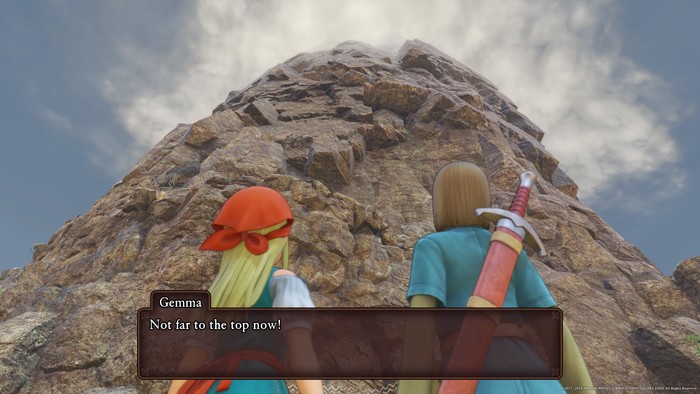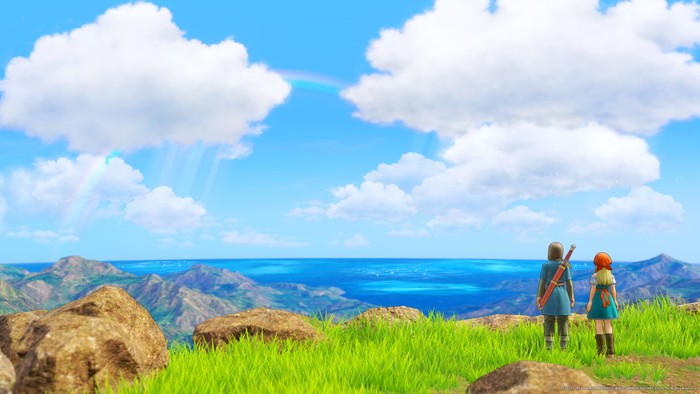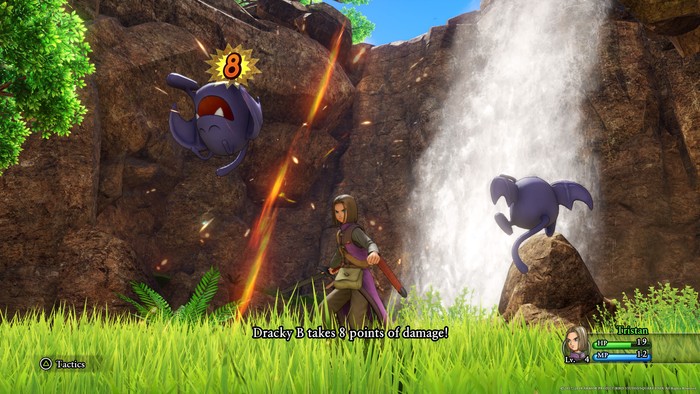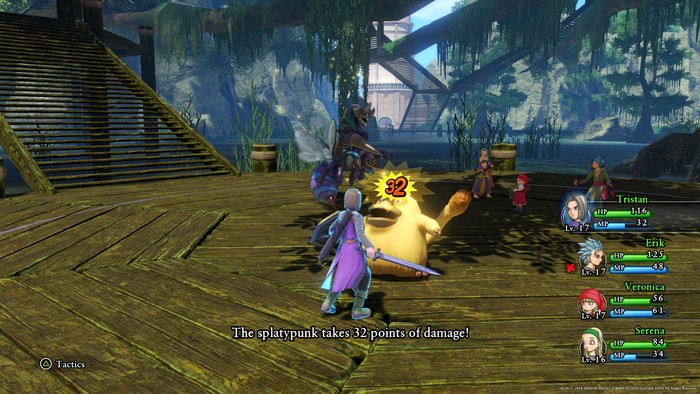The First 12 Hours: Dragon Quest XI
by Branden Johnson,Dragon Quest has an incredibly long and rich history. It's one of the most storied franchises in all of video games. Yet, for some reason, Americans know very little about it. In Japan, it's considered the top RPG franchise, followed by the US favorite, Final Fantasy. One of my first video game experiences was playing the original Dragon Quest (known as Dragon Warrior here in the US), but it never really captured my attention. Japan never lost the love, however, and as Dragon Quest reaches its eleventh mainline title, they're keeping things traditional while incorporating a ton of quality-of-life improvements to make the game palatable for modern audiences.

I've spent around a dozen hours with the game so far, and given that DQXI runs about 100 in total, these are far from final impressions. Regardless, I've gotten a taste of the most important bits. What I've found is a game that seems to be the perfect entrypoint for a nation of gamers who have somehow avoided the charms of Dragon Quest until now.
In Dragon Quest XI, you are the reincarnation of the Luminary, a hero who saved the world from the forces of darkness long ago. This fact is dropped on you somewhat nonchalantly on the day of your coming-of-age ceremony, and you're sent off to meet the king and figure out what you must do next. Things don't exactly go as planned, and you suddenly find yourself on a different kind of adventure. Along the way, you meet a variety of friends, and you'll have the chance to help them with their personal problems, too. The story so far has been relatively simple, compared to many of Dragon Quest XI's contemporaries. Its main character in particular is an emotionless, wordless avatar who nonetheless everyone seems to really like. Your level of dialog interaction is limited to rare opportunities to respond Yes or No, with either answer leading you to the same conclusion, so we're talking about a level of interactivity that's below even other games with player-defined protagonists, like Fallout or The Elder Scrolls. But while the hero might be a little lackluster, the rest of the cast more than makes up for him. Dialog is witty, lines are delivered adeptly, and the polish on the game's storytelling is apparent. There are a few surprising twists even early on in the game, so the overall plot has me intrigued, to say the least.

Dragon Quest has always been a bit more about the gameplay than the story, however, and this is the area where DQXI stays the most true to form. Well, in most ways. In DQXI, you wander around an overworld that is made up of fairly large areas separated by loading screens. Loading is not very intrusive, but I do think an opportunity was missed to make this a Final Fantasy XV-style open world. Regardless, you'll still spend a good amount of time traversing the land, either on foot or horseback. Enemies prowl the roads, fields, and forests, and coming into contact with one initiates a battle. The lack of random battles is a godsend, for sure.
Fights take place in the same area you're traversing, though the game will fade to black and reposition you slightly so you have a better space to work with. Here's the part where you might mistake Dragon Quest XI for an action RPG. Battle arenas are surrounded by a circle, and you have total freedom to run anywhere within it (leaving the circle will cause your party to attempt to run away). But for all its freedom of movement, DQXI is strictly, 100% turn based. This free movement battle system is merely an option offered to make battles look cooler. And believe it or not, it does. While functionally the freedom makes no difference -- you can't evade attacks by moving away, you don't do extra damage by attacking a monster from behind -- the freedom of movement does make even simple battles feel a lot more dramatic and intense. If you're not interested in all that and would rather have an even more traditional experience, you can change to a movement-free system in the menu.

By default, you'll enter commands for the hero, and your party members will be controlled by A.I. At any point during combat, however, you can pull up a menu to either change your partners' strategies or set yourself up to take full control of them. For the most part, the A.I. is smart enough to ably handle regular battles, though additional control comes in handy during tricky boss fights.
The actual ins and outs of combat will be familiar to almost anyone who has played a JRPG in the last thirty years. You'll attack monsters, cast spells, use special techniques. You'll use buffs on your team and cast debuffs on monsters (and they'll be doing the same to you). It's about as traditional a battle system as you're likely to find in 2018. That's not to say Square Enix has left it at that, though. The Pep system will cause your characters to occasionally go into a sort of overcharged mode, where their attacks do more damage. Characters that are pepped up will stay that way for several turns, and it carries over between battles, too. When multiple characters are Pepped at the same time, they can do special combination attacks that do a ton of damage at the cost of losing their Pep status. It's not a particularly innovative addition, but it adds some enjoyable variety to battles.

Characters level up as they do in most JRPGs -- gain enough experience points, rise in level. Stats increase predictably, and characters learn new spells at set points. One change, also seemingly borrowed from many other games, is the addition of skill points, which you gain as you level up. You can spend these points on a character's skills on a gameboard-like grid. Spending points to earn a skill will unlock the adjacent skills for purchase. Each character has a few different boards to focus on, with lots of opportunity to purchase stat increases or new techniques.
I don't mean to suggest that Dragon Quest XI feels derivative with things like skill points - in the context of a Dragon Quest game they feel innovative, providing a bit of modern-day complexity and control over your progression. There are other small improvements that make playing the game more enjoyable, such as a quick-heal option that will bring your characters to full health with no need to manually cast spells or use items between battles. Fast travel is also made available pretty early on via a spell (though that's not exactly new to Dragon Quest). Crafting new weapons and armor is possible at campsites where you can heal and save your game, too. I've actually found the crafting system quite enjoyable, though I shy away from it in most games. The best weapons and armor can't be bought in stores -- instead, you'll need to find recipes in books and other places and craft them yourself. The actual crafting process involves a mini game and a bit of chance, but you never feel penalized for failing, and the reward for success is great. Raw materials can be found at various points around the world, and they regenerate somewhat quickly, so you won't find yourself without the specific item you need to craft that new sword for long.

When you're not battling, making weapons, or managing your skills, you'll be exploring the world, and man, it's a beautiful one. Akira Toriyama's character designs look great in HD, and the world is lush and vast and full of things to look at, if not that much to actually interact with. Strangely, there is a bit of texture/shadow pop-in, even on the PS4 Pro, which is disappointing, but it's nothing too serious. You'll spend a lot of time moving the camera around, taking in the sights. But it's not just impressively vast; there's a ton of detail in the smaller spaces, too. Shops are full of unique items, bookshelves loaded with not just books but framed pictures and liquor bottles, and everything is rendered with what seems to be the utmost care. Pushing in the left analog stick puts you into a first-person view mode, so you can get an even better look. The level of detail goes a long way toward making the world feel alive.
While the visuals are often breathtaking, the same, unfortunately, can't be said about the music. Compositionally, the score by Kōichi Sugiyama isn't terrible, but the instrumentation is almost exclusively subpar MIDI-style, and it detracts a lot from the experience. Given the high quality poured into every other aesthetic, the low-fi music was clearly an intentional choice and not the result of a lack of budget, which makes it even more baffling.
There are a lot of great JRPGs to play, and until now, I've avoided one of Japan's most famous series because I didn't get it. I wasn't nostalgic for it, and I avoided it because it seemed both too simple and too difficult in all the worst ways. I think I was wrong. Dragon Quest XI is a game that rewards careful play, one that is proud of its roots, and one that knows you might need a bit of help getting into it. I've got a long way to go before I can definitively say this, but Dragon Quest XI may be a strong game of the year contender for me, which is a sentence I never thought I'd write. Put aside your preconceived notions and give it a shot.
discuss this in the forum (1 post) |